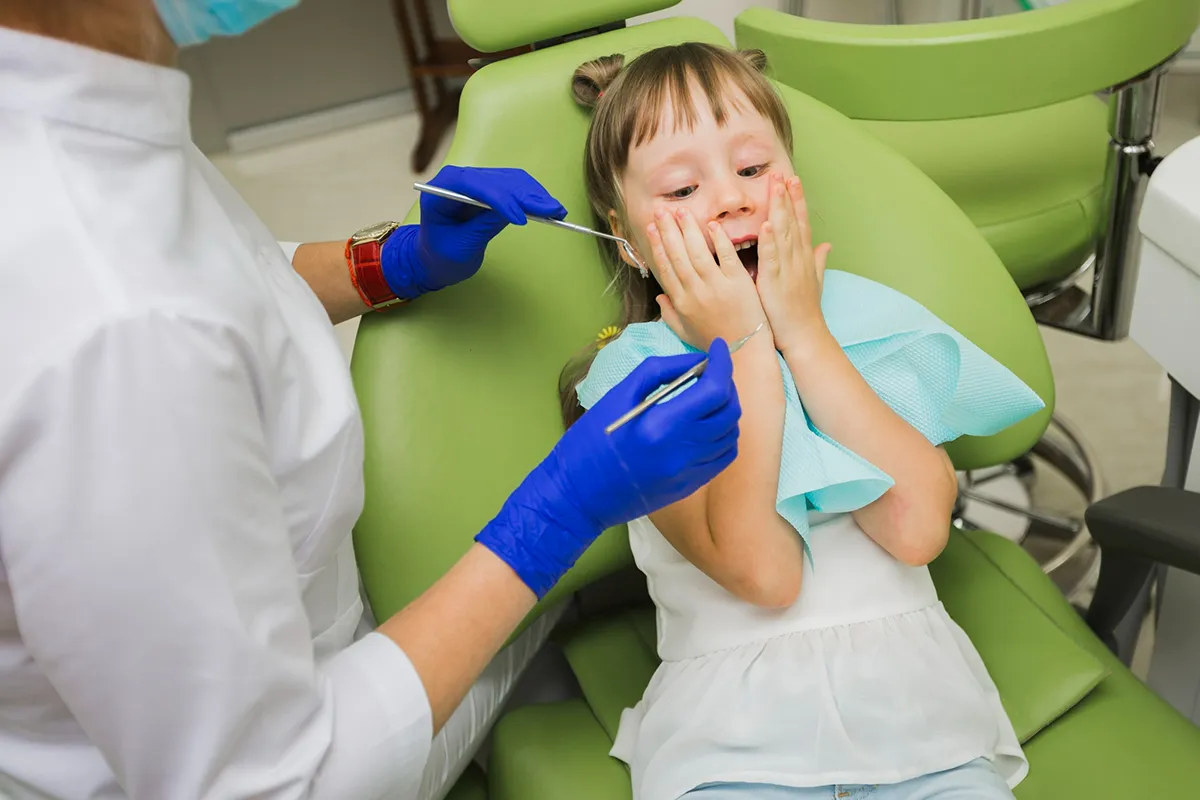Why Should You Choose Dental Crowns for Your Child?
The success and safety of dental crowns for children depend on several factors, including the child's overall oral health, the dental problem's severity, and the dental work's quality. Parents should consult with a pediatric dentist to determine if a dental crown is the best treatment option for their child.
Research has shown that dental crowns can help prevent the need for tooth extraction in children with extensive decay or damage to their primary teeth. A Journal of Clinical Pediatric Dentistry study found that parents and children were delighted with the appearance and function of dental crowns in primary teeth.
"Dental crowns in children are generally safe and well-tolerated, with a low incidence of complications or adverse effects. A study in the Journal of Dentistry for Children found that dental crowns restored primary teeth in 90% of cases".
Reasons to Choose a Dental Crown for Your Child
The decision to place a dental crown on a child's primary tooth depends on the specific situation and the recommendations of a pediatric dentist. Sometimes, a dental crown may be necessary to restore a decayed or damaged primary tooth and prevent further dental problems.
Dental crowns are one of the great options to restore your child's oral health. The American Academy of Pediatric Dentistry asserts that dental crowns are the most common curative treatment for children aged 0-5 years, with a prevalence rate of approximately 22%. Here are some of the reasons that state it may be worth considering a dental crown for your child's primary tooth:
Preserve the tooth - Primary teeth play an essential role in a child's oral development, and it is vital to preserve them until they naturally fall out. A dental crown can help save a highly decayed or damaged primary tooth. In doing so, it helps prevent the need for tooth extraction.
Restore function - A dental crown can restore the task of a primary tooth, allowing the child to chew and speak properly.
Prevent further damage - By addressing a decayed or damaged tooth with a dental crown; children can avoid more serious dental problems, such as infections or needing more extensive dental work.
Aesthetic appeal - Dental crowns can match the color of the child's natural teeth, creating a natural-looking smile that can boost the child's self-confidence.
Durability - Dental crowns are typically very durable and can easily resist the wear and tear of a child's active lifestyle.
Cost-effectiveness - Depending on the specific situation, dental crowns can be a cost-effective option for restoring a child's damaged or decayed teeth.

However, one should keep in mind that every child's situation is different, and there may be cases where a dental crown is not necessary or not recommended. Consulting a pediatric dentist is best to determine if a dental crown is the best treatment option for your child's primary tooth.
Types of Dental Crowns for Children
Several dental crowns are suitable for children, depending on the child's specific dental needs and the dentist's recommendations. Here are a few common types of dental crowns for children:
- Stainless steel crowns - Dentists often use stainless steel crowns to restore primary teeth in children due to their durability and cost-effectiveness. They can quickly and easily place prefabricated stainless steel crowns over decayed or damaged teeth.
- Composite resin crowns - Dentists can match the color of composite resin crowns to the child's natural teeth, making them a popular option for restoring front teeth in children.
- Zirconia crowns - Dentists prefer using zirconia crowns to restore primary teeth in children because they are durable and comprise a well-built ceramic material. Additionally, they can match the natural color of the child's teeth since they are tooth-colored.
- Porcelain-fused-to-metal crowns - Dentists use porcelain-fused-to-metal crowns to restore primary teeth in children. These crowns are made of metal and porcelain, making them durable and matching the child's natural teeth color.
The type of dental crown that is best for a child depends on several factors, including the location of the tooth, the severity of the decay or damage, and the child's age and overall oral health. A pediatric dentist can help determine which type of dental crown is the best choice for your child.
Can Dental Crowns Work on Baby Teeth?
Dental crowns can be placed on baby teeth, also known as primary teeth. Baby teeth are essential for a child's oral development and must be kept in place until they naturally fall out. Dentists often use crowns to treat baby teeth that are severely decayed, damaged, or have undergone a root canal treatment.
A baby tooth lost prematurely can cause problems with the child's bite and alignment of the adult teeth. Therefore, a dental crown can be a good option for preserving a baby's tooth until it comes naturally. It is essential to consult with a pediatric dentist to determine if a dental crown is the best treatment option for your child's baby tooth.
The procedure of Dental Crown for Children
The procedure for placing a dental crown for kids is similar to that of adults, although there may be some additional considerations to ensure the child's comfort and safety. Here is a brief description of the steps involved in placing dental crowns for kids:
- Examination and diagnosis - The first step for the pediatric dentist is to examine the child's tooth and determine if a dental crown is the best treatment option. The dentist may take X-rays or other images to assess the extent of the damage or decay.
- Tooth preparation - To prepare the tooth for the crown, the dentist will remove any decay or damage and shape the tooth to fit the crown. The dentist may need to remove more of the tooth structure for primary teeth to accommodate the dental crown.

- Crown fabrication - Depending on the type of crown, the dentist may either take an impression of the prepared tooth or use a prefabricated crown to fit the child's tooth.
- Crown placement - The dentist will place the crown over the prepared tooth once it gets ready. Also, he'll make some necessary adjustments to ensure it's a proper fit. The crown will then be secured in place using dental cement.
- Follow-up care - After crown placement, the dentist will provide instructions for caring for the crown and monitoring the child's oral health. The child may need to avoid certain foods or activities for a while to ensure the crown is secured correctly.
Proper preparation and maintenance can lead to a safe and successful dental crown placement in children. The dentist will ensure the child's comfort and safety throughout the procedure, including using local anesthesia or other pain management techniques as needed.
The dentist may also use distraction or sedation to help keep the child calm and relaxed during the procedure. This method can effectively repair decayed or damaged teeth and promote better oral health for the child.
How to Care for Your Child's Dental Crown?
Providing adequate care and maintenance to a child's dental crown ensures longevity and good condition. Consider these valuable tips to maintain and care for your child's dental crown:
Encourage good oral hygiene - Regular brushing and flossing are essential for maintaining good oral health and preventing decay and damage to the crown. Ensure your child brushes twice daily with fluoride toothpaste and flosses daily.
Avoid hard or sticky foods - Your child should avoid chewing on hard or sticky foods, such as candy or ice, which can put excess pressure on the crown and potentially cause damage.
Wear a mouthguard during sports - If your child plays sports or engages in other activities that pose a risk of dental injury, it is essential to wear a properly fitting mouthguard to protect the crown and other teeth.
Regular dental check-ups - Regular check-ups with a pediatric dentist are essential to monitoring the health of the crown and ensuring there are no signs of decay or other issues. Your child's dentist may recommend more frequent check-ups to monitor the crown's condition.
Maintain a healthy diet - Keeping a healthy diet that includes vitamins and minerals like calcium and vitamin D can help preserve your child's dental health. It can help keep your child's teeth and gums healthy and strong, which in turn can help maintain the health of the crown.
Avoid grinding or clenching - Grinding or clenching teeth can put excess pressure on the crown and cause damage. If your child shows signs of bruxism, talk to their dentist about options for protecting the crown, such as a nightguard.
By following these tips and ensuring your child receives regular dental care, you can help keep your child's dental crown in good condition and promote oral health.
Conclusion
Dental crowns can be a valuable treatment option for children with damaged or decayed teeth. By restoring the function and appearance of the tooth, a crown can help prevent further damage or decay and promote good oral health. When deciding on a dental crown for your child, seeking advice from a qualified dentist is crucial to assess the best course of action for your child's unique needs.
Contact your dentist in Stockton, Sajjad Rizvi, DDS at Happy Kids Dental, to know about Dental Crowns for Your Child.
Resource:
What are the options for kids' dental crowns?
*This media/content or any other on this website does not prescribe, recommend, or prevent any treatment or procedure. Therefore, we highly recommend that you get the advice of a qualified dentist or other medical practitioners regarding your specific dental condition*
Subscribe To Our Newsletter
Get Updates And Learn From The Best


